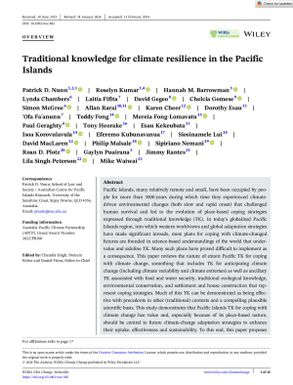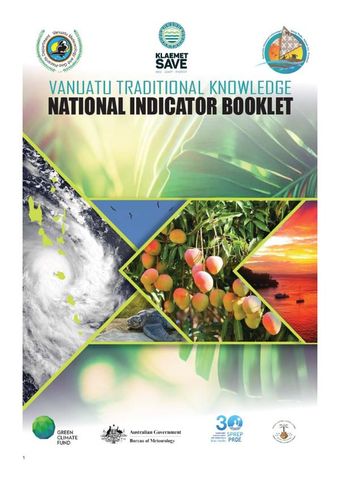Traditional knowledge for climate resilience in the Pacific Islands
- Description:
- Pacific Islands, many relatively remote and small, have been occupied by people for more than 3000 years during which time they experienced climate-driven environmental changes (both slow and rapid onset) that challenged human survival and led to the evolution of place-based coping strategies expressed through traditional knowledge (TK). In today's globalized Pacific Islands region, into which western worldviews and global adaptation strategies have made significant inroads, most plans for coping with climate-changed futures are founded in science-based understandings of the world that undervalue and sideline TK. Many such plans have proved difficult to implement as a consequence. This paper reviews the nature of extant Pacific TK for coping with climate change, something that includes TK for anticipating climate change (including climate variability and climate extremes) as well as ancillary TK associated with food and water security, traditional ecological knowledge, environmental conservation, and settlement and house construction that represent coping strategies.
- Display date:
- 2024
- Location:
- Pacific Region
- Collections:
- Secretariat of the Pacific Regional Environment Programme (SPREP)
- Publisher:
- Wiley Periodicals LLC.
- Content partner:
- Secretariat of the Pacific Regional Environment Programme (SPREP)
- Availability:
- Not specified
-
Copyright status: All rights reservedFind out more about what you are able to do with this itemThis item is all rights reserved, with means you'll have to get permission from Secretariat of the Pacific Regional Environment Programme (SPREP) before using it. For more information, please see our use and reuse page.What can I do with this item?Non-infringing useNZ copyright law does not prevent every use of a copyright work, and this item may be hosted by an international institute or organisation. You should consider what you can and cannot do with a copyright work.No sharingYou may not copy and/or share this item with others without further permission. This includes posting it on your blog, using it in a presentation, or any other public use.No modifyingYou are not allowed to adapt or remix this item into any other works.No commercial useYou may not use this item commercially.
Related items
Welcome and warm Pasifik greetings
The information on this site has been gathered from our content partners.
The names, terms, and labels that we present on the site may contain images or voices of deceased persons and may also reflect the bias, norms, and perspective of the period of time in which they were created. We accept that these may not be appropriate today.
If you have any concerns or questions about an item, please contact us.


